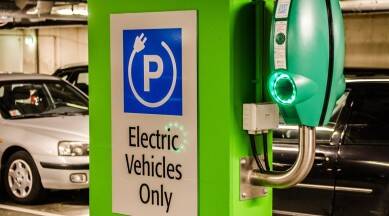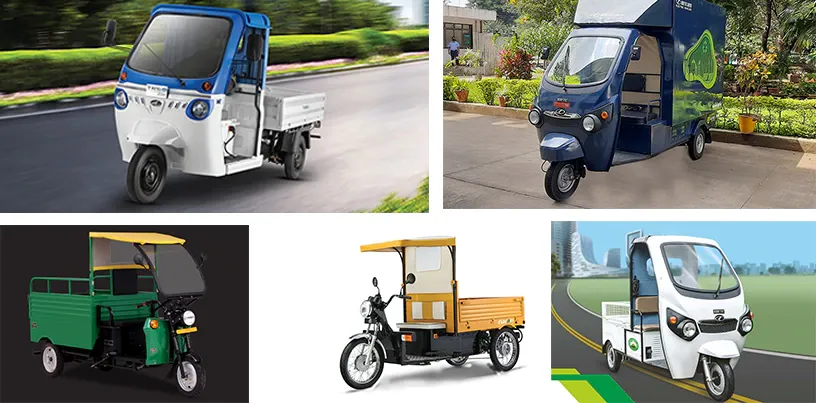Ad
Ad
Indian 3-Wheeler Industry Moving Rapidly Towards EVs: Torch-Bearers for EV Revolution in India
A study from ICRA (Investment Information and Credit Rating Agency) reveals that electric 3-wheelers have been at the helm of the Indian EV Revolution
A study from ICRA (Investment Information and Credit Rating Agency) reveals that electric 3-wheelers have been at the helm of the Indian EV Revolution.

It's been said over and over again, that the three-wheeler industry has led the EV revolution in India in the Indian markets. And according to a study by the Investment Information and Credit Rating Agency (ICRA), since they can carry more weight, go farther, and frequently run on a single charge, three-wheelers would be at the forefront of the Indian EV revolution. The number of new electric three-wheelers (e3w) sold in the country increased significantly in May, jumping from 50% each of the three months until April 2022 to 56% overall. The makers of electric three-wheelers expect that the industry will grow.
These numbers in themselves prove how the e3Ws have revolutionized the Indian EV markets, making them a more acceptable, reliable, and trustworthy alternative to the otherwise costly petrol-driven bum-bums.
ICRA predicts that by 2025, battery-powered three-wheelers will account for over 30% of all 3W sales, with electric two-wheelers making for 8–10% of all 2W sales. The demand for cars in 2020 suffered as a result of COVID-19. On the other hand, compared to prior years, the number of electric vehicles has climbed by approximately 40%. EV sales will account for 4.4% of all new car sales worldwide in 2020. Although the transition to electric vehicles (EVs) from gasoline and diesel vehicles is inevitable, India will have a slower rate of adoption than China, Europe, or the US.
Due in large part to internet shopping, the market for electric three-wheelers will continue to grow dramatically. Particularly in the wake of the pandemic, Indian consumers are buying an increasing variety of online goods from the comfort of their homes.
This transformation has resulted in a sharp increase in the need for last-mile delivery networks. The World Economic Forum predicts that by 2030, e-commerce would account for 78% of the global market. Delivery and other vehicles will rise in number by 36% by 2030. In response to the growing demand for last-mile connection and e-commerce for better and faster product delivery, the popularity of electric three-wheeler vehicles will increase.
In contrast to electric two-wheeler vehicles, light and medium commercial trucks are expensive to operate and are unable to provide the ease of driving through congested areas. As a result, there is a growing market for electric three-wheelers. Electric three-wheelers gain from federal and state incentives in addition to having a lower total cost of ownership than ICE rivals. The running cost of an electric three-wheeler is 50–60 paisa per kilometer, as opposed to 3.5–4 INR for a diesel van.
Several big corporations have hopped on the EV three-wheeler bandwagon due to their need to save expenses and their carbon footprint. Electric three-wheelers may result in a reduction in carbon dioxide emissions from the tailpipe of 13 tonnes per 100 kilometers.
For the local EV ecosystem to be stimulated, the production of EV batteries and powertrain components as well as the development of infrastructure for charging and battery swapping will remain essential. It also helps to reduce costs. The electric vehicle industry would receive the much-needed push toward localizing manufacturing from the production-linked incentive (PLI) program for automotive components and ACC batteries. However, there will continue to be a short- to medium-term reliance on foreign battery cells.
Before localizing the battery management systems and other electronics in the upcoming years, many businesses should focus on localizing other components, such as the motor and controller. Financing EVs is the biggest challenge because of rising interest rates. Several public sector banks should broaden their EV financing program for electric three-wheelers in order to address this problem and ensure that micro and small company owners have access to sufficient capital as well. The organized electric three-wheeler market in India has grown significantly since the FAME II policy was implemented as a result of the law's capacity to reduce the high sticker price of three-wheelers running on Li-ion batteries.
A modern lithium-ion battery costs approximately 2.5 lakh rupees more than a lead-acid battery. The lithium-ion battery electric vehicle FAME II incentives, however, greatly reduce this price disparity.
Some state governments are also implementing progressive EV policies to provide the sector with the boost it needs. For "electric carriers," the Delhi Government relaxes its current ban on LCV parking and use during specific hours. The largest state subsidy to be announced in India was also featured. The Telangana administration has officially made it official that there would be no road taxes or registration fees for electric cars (EVs) in the state. This has also made it possible to charge a different price to pay for the installation of EV charging stations. The State is also asking members to take advantage of the benefits of the 10-year policy.
More News
Ola Maps Announces New Pricing Structure and Future Product Roadmap
In a bold move, Ola Maps unveils a reduced pricing structure to challenge tech giants and boost Indian innovation.
19-Jul-2024 11:21 AM
Read Full NewsOla Maps Announces New Pricing Structure and Future Product Roadmap
In a bold move, Ola Maps unveils a reduced pricing structure to challenge tech giants and boost Indian innovation.
19-Jul-2024 11:21 AM
Read Full NewsExciting New Car Launches Expected in October 2023: A Sneak Peek at the Latest Models
Discover the latest car launches from luxury to electric, Nissan Magnite AMT, Lexus LM MPV, Force Gurkha 5-Door and others, expected in October 2023.
30-Sep-2023 04:28 PM
Read Full NewsExciting New Car Launches Expected in October 2023: A Sneak Peek at the Latest Models
Discover the latest car launches from luxury to electric, Nissan Magnite AMT, Lexus LM MPV, Force Gurkha 5-Door and others, expected in October 2023.
30-Sep-2023 04:28 PM
Read Full NewsTesla making it easier to buy electric cars, giving loans with 7-year terms
Tesla is now making the electric cars buying journey more easier for the buyers, offering 7 year term loan.
24-Jul-2023 03:13 PM
Read Full NewsTesla making it easier to buy electric cars, giving loans with 7-year terms
Tesla is now making the electric cars buying journey more easier for the buyers, offering 7 year term loan.
24-Jul-2023 03:13 PM
Read Full NewsFour-Wheeler Diesel Engine Come to an End by 2027 | Energy Transition Panel Statement
Diesel Cars ban in these cities till 2027 said the Energy Transition Committee.
08-May-2023 01:38 PM
Read Full NewsFour-Wheeler Diesel Engine Come to an End by 2027 | Energy Transition Panel Statement
Diesel Cars ban in these cities till 2027 said the Energy Transition Committee.
08-May-2023 01:38 PM
Read Full NewsHyundai Takes Over GM's Talegaon Plant: A Step Forward in Automotive Industry Expansion
Hyundai Motor India signs a non-binding term sheet agreement with General Motors India to acquire identified assets related to the Talegaon Plant in Maharashtra.
13-Mar-2023 04:25 PM
Read Full NewsHyundai Takes Over GM's Talegaon Plant: A Step Forward in Automotive Industry Expansion
Hyundai Motor India signs a non-binding term sheet agreement with General Motors India to acquire identified assets related to the Talegaon Plant in Maharashtra.
13-Mar-2023 04:25 PM
Read Full NewsMaruti Suzuki Jimny Special Edition's Retro Stripes: Get Ready to Turn Heads
Maruti Suzuki Jimny has unveiled the Heritage Edition which features retro body decals and decorations.
06-Mar-2023 11:07 AM
Read Full NewsMaruti Suzuki Jimny Special Edition's Retro Stripes: Get Ready to Turn Heads
Maruti Suzuki Jimny has unveiled the Heritage Edition which features retro body decals and decorations.
06-Mar-2023 11:07 AM
Read Full NewsAd
Ad
Cars In India
Toyota Camry
₹ 48.00 Lakh
Honda Amaze
₹ 8.00 - 10.90 Lakh
Audi Q7
₹ 88.66 - 97.81 Lakh
Mahindra XEV 9e
₹ 21.90 - 30.50 Lakh
Tata Harrier EV
₹ 24.00 - 28.00 Lakh
MG M9 EV
₹ 1.00 - 1.10 Cr
Maruti e Vitara
₹ 20.00 - 25.00 Lakh
Hyundai Creta EV
₹ 22.00 - 26.00 Lakh
MG Cyberster
₹ 60.00 - 65.00 Lakh
Ad
Ad
Ad